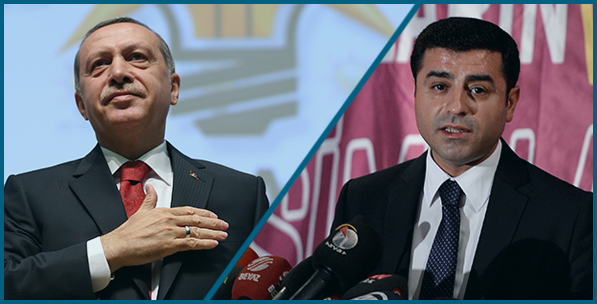The “local-presidential-general” elections occurring over the period of 2014-2015 were to become a relay race, or rather an “election trio.” And, as expected, they did. The political landscape after the March 30 local elections roughly indicated who would be the winner of the presidential election to be held in August 2014. However, the presidential election in Turkey will have much more important implications other than who wins the race. We have a pretty good idea about the result since Prime Minister Recep Tayyip Erdoğan announced his candidacy.
When Erdoğan wins the presidential race, changes will take place in the most critical seats of Turkish governance. Changes in the presidential, prime ministry and cabinet seats will be inevitable. Consequently, this beginning of a new period is indispensable. First of all, the scarcity of candidates tells us a lot about this race. There are three presidential candidates, but actually only two of them are running and the other one keeps saying that “he will not be involved in politics.” The two runners are none other than Erdoğan and the pro-Kurdish Peace and Democracy Party (BDP) leader Selahattin Demirtaş.
If the tutelage regime that smeared the presidential elections in 2007 were told that seven years later, in the next presidential race, there would not be a Kemalist candidate – and not only this but also that the two candidates would represent the two Kemalist fears, what would have they done?
Along the way, there will be implications of the choice that the opposition Republican People’s Party (CHP) and the Nationalist Movement Party (MHP) have made. The implication of this choice in the short run is that the CHP and MHP simply cannot participate in the presidential race.
Inevitably, of course, there will be a price tag attached to the transformation from being an actor who fails in the elections to an actor who cannot even participate in the election. Missing the presidential race will cost the two opposition parties dearly in the 2015 general elections. This will negatively and directly affect both the balances within the parties and the probability of transformation of these parties into real political actors in the 2015 general elections.
There is a power imbalance between the two real actors of the Aug. 10 presidential election. As Erdoğan runs a presidential campaign easily, Demirtaş has a limited base and constituency. Still, one should give Demirtaş the credit for running. The BDP leader has shown courage for normalization that the 20th century parties of the tutelage regime, the CHP and the MHP, could not show. Of course, the progress that Erdoğan has made since 2009 in the resolution of the Kurdish question plays a big role in this.
Now we see a New Turkey election ahead of us – an election, where those who fight against the resolution process have failed to introduce a presidential nominee – an election where the pioneer and the partner of the resolution process compete with each other. In the upcoming years, there will always be two candidates in the elections until the actors of the old Turkey undergo a transformation to ask for the support of all of Turkey!
In this article
- Domestic Policy
- Opinion
- 2007
- 2009
- 2014
- 2015
- Daily Sabah
- Elections
- Global Actors | Local Actors
- Kemalism
- Kurdish Community
- Kurdish Peace Process
- Kurdish Question
- Local Elections
- Normalization
- Opposition
- Prime Minister
- Recep Tayyip Erdoğan
- Selahattin Demirtaş
- The President of the Republic of Türkiye
- The Presidential Election
- Turkish Local Elections
- Turkish President
- Türkiye's Republican People's Party (CHP)
- Türkiye’s Nationalist Movement Party (MHP)
- United States (US)

